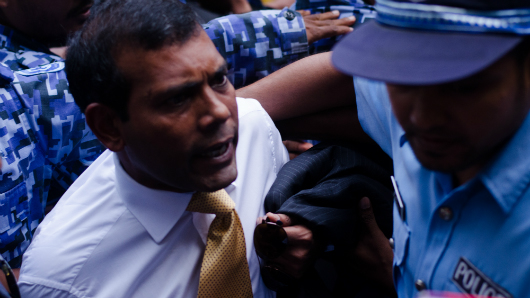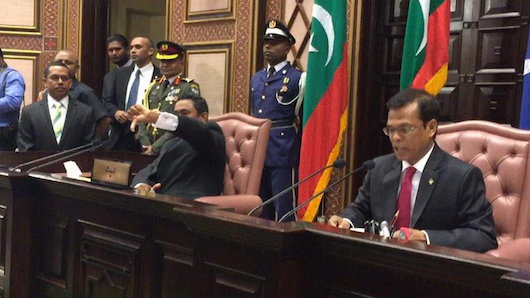This article first appeared on DhivehiSitee.com. Republished with permission
It is an extremely tense day in the Maldives as tens of thousands of people wait on tenterhooks for what seems to be the inevitable: the imprisonment of opposition leader, former president and icon of democracy, Mohamed Nasheed.
The outcome of the ‘trial’ which Nasheed has been subjected to is certain, the verdict written long before he was charged with ‘terrorism’ and remanded in custody on the island of Dhoonidhoo on 22 February.
Everything that followed since that Sunday, over two weeks ago now, has been a sham and a travesty against justice. The barbarity was put on full display to the world, when Nasheed was brought to ‘court’ for the first hearing. Policemen, belonging to the notorious Special Operations, pushed and shoved Nasheed to the ground.
Pictures and videos of the event shocked the country, and the world.

The current rulers, led by Yameen Abdul Gayoom, shrugged off the outcry with nonchalance. Locally, the police claimed Nasheed had pulled a stunt, fallen to the ground voluntarily like a footballer faking an injury looking for to be rewarded with a penalty. It did not matter that video and pictorial evidence told a different story.
Internationally, foreign minister Dunya Maumoon was recalcitrant, insisting that Nasheed’s trial is a ‘domestic issue’ that no foreigners have a say in. The government remained impervious to all outside criticism. Even the cancellation of a planned trip by India’s Prime Minister Narendra Modi, a diplomatic slap of substantial magnitude, did not make any impact on its determination to pursue with their chosen path of leading Nasheed to jail. In fact, as time passed, the government grew more belligerent.
Yameen Abdul Gayoom said on March 9 that people in distant foreign lands should butt out of Maldivian affairs. Brushed aside were the many international treaties which the Maldives is signatory to, which gives the international community the right to particular actions during certain circumstances — such as in times of the destruction of rule of law.
‘Trial’
And what a destruction it has been. Every hearing in the court, itself unconstitutional, has dealt a deathblow to the concept of rule of law. The Prosecutor General’s appointment now appears to have been engineered for the very purpose of this prosecution, as are the panel of three ‘judges’. None of them have adequate legal qualifications, and all of them are in each other’s pockets. All of them have close ties to the man at the centre of these ‘terrorism’ charges—Ablow Ghaazee, himself accused of misconduct and corruption—who Nasheed allegedly ‘kidnapped’.
The three man bench has obstructed justice at every opportunity, refusing to give Nasheed’s lawyers enough time to study evidence; giving them evidence on CDs that do not open or have been damaged; refusing Nasheed the opportunity to appoint new lawyers when the current ones objected to their unlawful treatment; and incredibly, refusing to allow Nasheed to present witnesses with the judgement that no witness can disprove the prosecution case.
Every hearing has been held after sundown, and Nasheed brought to court in darkened vehicles under heavy police escort. The lengths to which prosecutors have gone to separate Nasheed and his supporters, and to prevent media from taking pictures of him, have been ludicrous at times.
On 8 March, about an hour before Nasheed was brought to court, the powers that be spread a blue banner across the entrance to the building, placed strategically to cover the camera angle from which Raajje TV usually shoots Nasheed’s court arrival. The banner read ‘Welcome, International Women’s Day.’ A blatant mockery not of justice alone, but also of women.
There has been much anguish among Nasheed’s supporters. On February 27 tens of thousand came out to protest against the court’s decision to remand Nasheed in custody throughout the trial. It was the biggest political gathering the capital island of Male’ had ever seen. People flooded the main street of Majeedhee Magu almost covering it from end to end.
Since then there have been protests every night and every day in various different locations across the country. But the government is refusing to listen to them no matter how many there are; it seeks to shut them down instead.
Every protest is manned by hundreds of Special Operations police, sometimes with reinforcements from the army. Almost every other protest ends in brutality and/or arrests. Scores have been arrested, taken to prison, then released with the unconstitutional condition that they don’t protest for periods of time as set by the court-–sometimes days, sometimes months.
Leaders of the MDP are handpicked for the arrests, making sure that less and less of them will be able to join protests against Nasheed’s arrest. One person—MP Fayyaz Ismail—refused to sign the court’s unlawful protest ban. He was given an extra 15 days in custody. There is no legal basis for such an order.
An increasing number of locations are being declared ‘no-protest zones’ for various reasons: for residents’ peace; for local business interests; for law and order, etc. etc. Freedom of assembly is being rolled back swiftly, and without hesitation. Other associated freedoms are under similar attack. Journalists are being barred from covering the trial without legal reason. Reporters are being banned from videoing places they are legally allowed to. Police are forcing them to delete footage already recorded without legal authority to do so. The state broadcaster is continuing to ignore the biggest ‘trial’ in the country’s recent history, completely ignoring its duty to keep citizens informed.
Thumbs down
Meanwhile, Yameen and members of his ruling cabal are relishing the distress and helplessness of supporters of democracy and Nasheed. Decorum and statesmanship are nowhere to be seen. When MDP MPs protested against Yameen’s inaugural speech in parliament, he gave into his indignation, getting up and waving his thumbs up and down, then up again, like a crazed Caligula in Roman times.

Yameen’s trusted sidekick, Tourism Minister Ahmed Adeeb, who has shrugged off corruption charges amounting to millions of US dollars and engineered the unconstitutional removal of the auditor general who dared bring up the charges, led a motorbike procession on the streets of Malé this weekend, calling to expedite Nasheed’s conviction.
Among the rats led by this pied piper on a bike with a Rolex watch on his wrist and a sapphire ring on his finger, was the current defence minister, ex-military General Moosa Jaleel. Jaleel in his eagerness to belong to Yameen’s cabal, and thus enjoy automatic immunity, forgot that he is himself on trial for the same charges he was calling Nasheed to be convicted for.
To further increase the public disgust level [or degree of impressiveness, if the onlooker is a supporter of Bro Adeeb], Adeeb has led a ‘movement’ that mimics Yameen’s thumbs-down gestures as if it is something to be celebrated and not shamed by. He has posed with his thumbs down with cabinet ministers and parliament members—as well as with his usual string of young, disaffected men on the fringes, and in the heart of, Maldives’ violent gang culture. Everyone in the Motorcade of The Shamelessness wore t-shirts emblazoned with a thumbs-down signal.
This hatred of Nasheed as a person cultivated with relish by Yameen and Adeeb has been embraced by thousands of their supporters. It has blinded them to the fact that what is being destroyed in this sham is not just Nasheed’s personal freedoms but also every single Maldivian’s many civil and political rights and their right to equal justice for all.
The fundamental problem with the Maldives’ transition to democracy was that it was unable, and oftentimes unwilling, to reform the judiciary. Few had the foresight to see where the democratic transition would end without an independent judiciary based on the principles of rule of law. Now, even on hindsight – with the results on full display – many are still too blinded by personal vendettas, grudges and hate to see that this ‘trial’ of Nasheed is the last nail in the coffin for a democratic future for the Maldives.
Years of anti-Nasheed propaganda have closed people’s eyes to the fact that whatever wrong he may have done, if they want themselves to be treated fairly and equally and live in a just society, they must protest against the injustice he is being subjected to.
Today it is the moral obligation for every Maldivian to stand up against injustice. The subject of concern is not a particular individual, be it Nasheed, Nazim, the common man jailed for six years for stealing a jar of fish-paste; or the murderer who is allowed to walk free because he is in the inner cabal. It is justice itself.
Last time the people should have stood up en masse for justice and did not, the Maldives was robbed of a free and fair election. The result is in office, orchestrating injustice, via the courts that engineered his election. This time if the people fail to stand up, it will shut all doors to another election in the foreseeable future; along with the doors to equal justice for all, quite likely for generations to come.
Dr Azra Naseem has a PhD in International Relations
All comment pieces are the sole view of the author and do not reflect the editorial policy of Minivan News. If you would like to write an opinion piece, please send proposals to [email protected]
Related to this story
“I was not afforded the rights of the accused,” says Judge Abdulla
Nasheed’s lawyers quit
State prosecutors influencing witnesses, claim Nasheed’s lawyers
Nasheed contests credibility of police and military witnesses in terrorism trial
Judges Didi and Yoosuf refuse to step down from Nasheed’s terrorism trial
Former President Nasheed arrives in court with arm in makeshift sling
Nasheed denied right to appoint lawyer and appeal “arbitrary” arrest warrant, contend lawyers
Likes (0)Dislikes
(0)Dislikes (0)
(0) 


